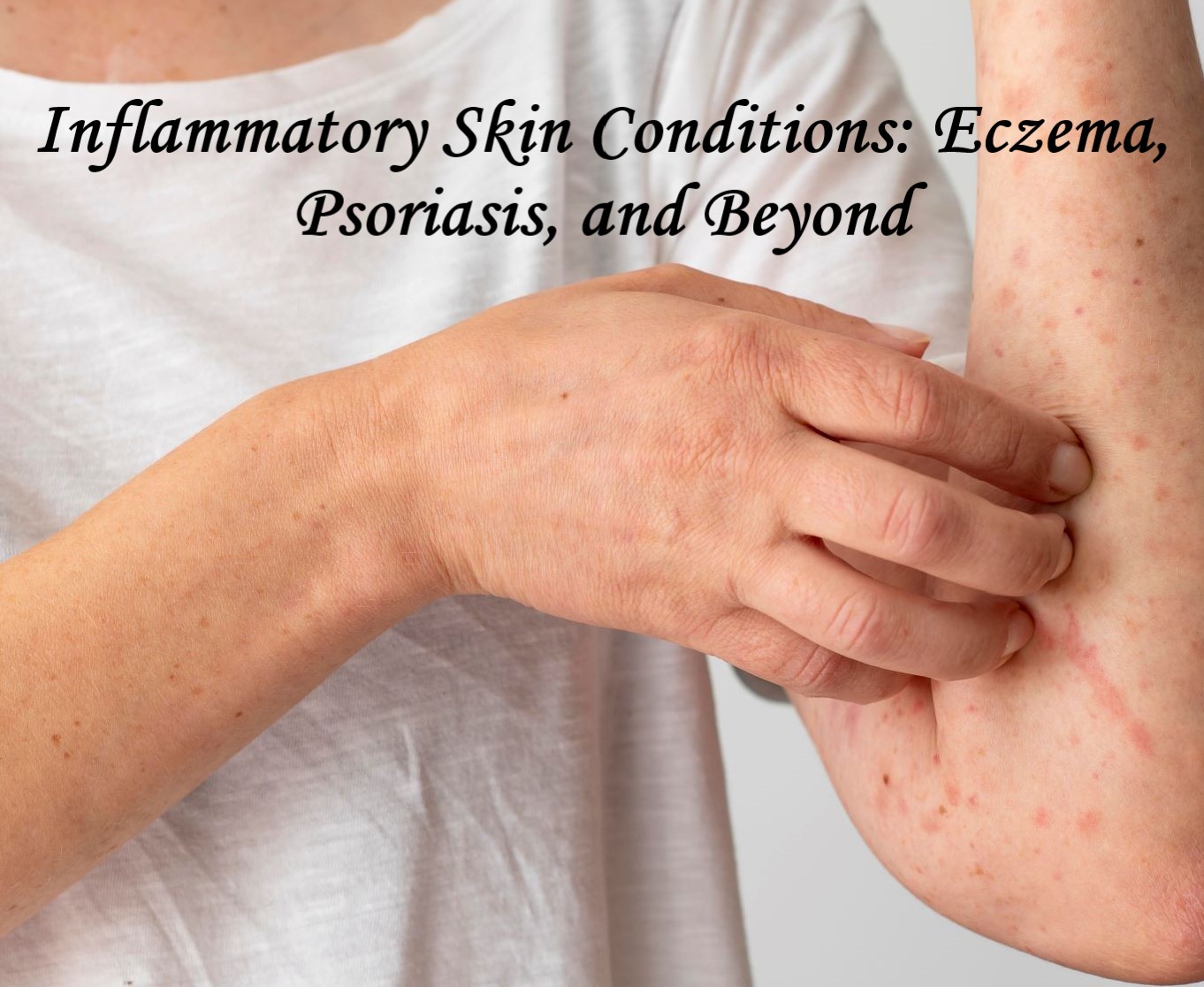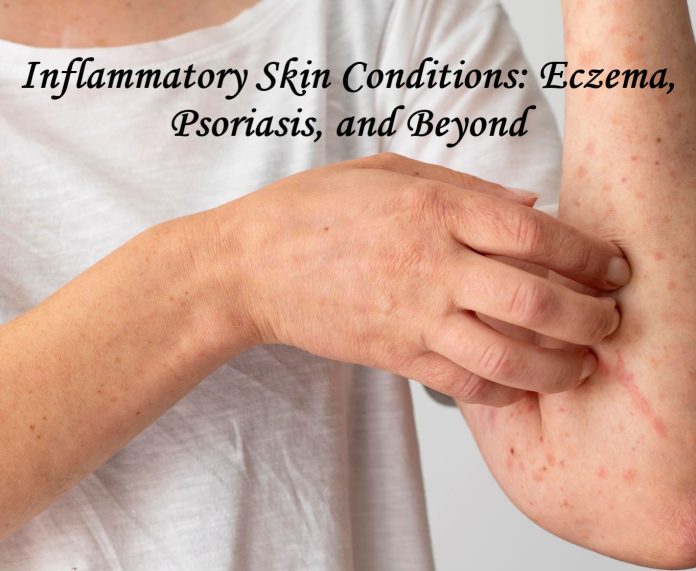Empowering Skin Health: Battling Eczema, Psoriasis, and More
Did you know that over 31 million people struggle with inflammatory skin conditions? Astonishingly, eczema and psoriasis affect not only their appearance but also their confidence and quality of life. If you’re tired of the itchy, flaky, and red skin that won’t quit, you’re not alone. It’s time to gain a deeper understanding of these inflammatory skin conditions that affect us physically and emotionally. What fuels the fire beneath the skin’s surface?
In this article, we embark on a journey to explore the intricate world of these conditions, unveiling their underlying causes, understanding the role of inflammation, and delving into their substantial impact on individuals’ quality of life.
Understanding Inflammatory Skin Conditions
Inflammatory skin conditions cover a wide range of disorders marked by skin inflammation. This inflammation can present itself in various ways, causing symptoms like redness, itching, swelling, and the development of scales or lesions.
Eczema and psoriasis are particularly noteworthy among these conditions due to their high prevalence and distinct clinical characteristics. Additionally, there are other related skin disorders, each presenting unique challenges and nuances.
Eczema
Eczema, or atopic dermatitis, is a chronic skin condition affecting millions worldwide. It showcases itself through intense itching, persistent redness, and the development of dry, scaly patches.
While the precise cause of eczema remains elusive, research suggests a complex interplay between genetic predisposition and immune system dysregulation in its development.
In the context of eczema, the immune system’s response triggers a chain of inflammation within the skin. This leads to the familiar symptoms that individuals who suffer from eczema experience. Inflammatory cells release chemicals that cause itching and worsen the condition, creating a challenging cycle to break.
Eczema goes beyond affecting just the surface of the skin; it also impacts individuals suffering from it emotionally. They deal with physical discomfort, self-consciousness, and disrupted sleep patterns due to constant itching.
The management of eczema necessitates a comprehensive approach that not only tackles the external symptoms but also addresses the underlying causes. This includes pinpointing and avoiding triggers, establishing consistent skincare routines focused on moisturization, and implementing topical corticosteroids or other immunomodulatory medications to regulate inflammation.
Ongoing research perpetually uncovers new treatment possibilities, instilling optimism in those who have battled with this condition for years.
Psoriasis
Psoriasis, another chronic inflammatory skin disorder, exhibits itself as raised, red patches of skin covered with silvery scales. This condition arises from an accelerated skin cell turnover rate, where new cells ascend to the skin’s surface excessively fast. Consequently, this process leads to the accumulation of scales and plaques.
The immune system’s role in this context is pivotal, as it mistakenly attacks healthy skin cells, triggering psoriasis. Furthermore, genetic factors strongly contribute to psoriasis, while environmental triggers like stress, infections, or minor skin injuries can worsen its symptoms.
The immune system’s inflammatory response leads to redness and irritation. Additionally, the continuous shedding of scales can cause physical discomfort and emotional distress. Individuals grappling with psoriasis often encounter challenges in their daily lives, encompassing physical discomfort, societal perceptions, and negative self-perception.
The approach to treatment varies, contingent upon the severity of the condition. Options contain topical treatments, light therapy (phototherapy), systemic medications, and biological drugs designed to target specific immune pathways involved in psoriasis.
Beyond Eczema and Psoriasis: Related Inflammatory Skin Disorders
Contact dermatitis, atopic dermatitis (distinct from eczema but interconnected), rosacea, acne, and lupus-related skin manifestations are other disorders that share inflammatory components with eczema and psoriasis.
Although they exhibit varying clinical presentations and underlying causes, a common thread of inflammation and immune system response unites these disorders.
The Role of Inflammation in Skin Health
Inflammation, a fundamental response of the body’s immune system, is a frontline defence mechanism against injury, infection, or harmful stimuli. When inflammation functions as intended, it aids the body in self-defence and promotes healing. However, the emergence of chronic inflammation can precipitate various health issues, including inflammatory skin conditions.
Immune responses to allergens, irritants, or autoimmune reactions can all contribute to the inflammatory cascade. Inflammatory cells release cytokine-signalling molecules that bring redness, swelling, and discomfort, synonymous with inflammatory skin conditions.
Impact on the Quality of Life
The striking visibility of inflammatory skin conditions can have profound implications on an individual’s overall quality of life. Beyond the physical discomfort, the emotional toll of managing an externally evident condition can be formidable.
Individuals contending with these conditions may grapple with self-consciousness, encounter societal stigmatization, and have low self-esteem. The perpetual need to manage symptoms and cope with emotional burdens can exacerbate stress levels and impede overall well-being.
Recognizing the significance of support is paramount. Whether that involves healthcare professionals, support groups, or mental health resources, seeking assistance can play a pivotal role in navigating the challenges posed by these conditions. Acknowledging that addressing inflammatory skin disorders’ physical and emotional facets is essential for comprehensive and effective care.

FNAC Test
FNAC Test for Breast: Understanding the Basics
Shifting our focus slightly, let’s explore a distinct medical procedure that holds profound importance in women’s health – the Fine Needle Aspiration Cytology (FNAC) test for assessing breast health. The FNAC test for breasts is minimally invasive.
It involves extracting a sample of cells from a breast lump, cyst, or suspicious area using a fine needle. The collected cells are then examined under a microscope to determine whether they are benign (non-cancerous) or malignant (cancerous).
The FNAC test for breast is invaluable in the diagnostic arsenal, furnishing insights into the nature of breast abnormalities without necessitating invasive surgical procedures.
FNAC Test Cost: What to Expect
While considering medical procedures, including the FNAC test, financial considerations invariably play a pivotal role.
The FNAC test costs are subject to change based on many factors. These factors encompass geographical location, the specific healthcare facility where the procedure is performed, and the extent of insurance coverage.
The FNAC test costs around Rs. 900 at Pathkind Labs.
In certain instances, insurance plans may cover the FNAC test cost, while in others, individuals might encounter out-of-pocket expenses.
To navigate this landscape effectively, it is prudent to establish communication with healthcare providers or insurance companies to acquire comprehensive information about the anticipated cost and potential coverage options for the FNAC test.
By being well-informed about potential costs, individuals can make decisions that align with their healthcare needs and financial considerations.
Are you considering a FNAC test? Book a FNAC test with Pathkind Labs today!
Conclusion
Inflammatory skin conditions such as eczema and psoriasis underscore the intricate interplay between our bodies, health, and emotional experiences. Whether it involves navigating the challenges posed by visible skin conditions or seeking diagnostic insights through procedures like the FNAC test, knowledge emerges as a potent catalyst for making informed and proactive choices in pursuing holistic well-being.
Also Read: Scientific information on 7 Health benefits of the cold shower
This post is for public information.

